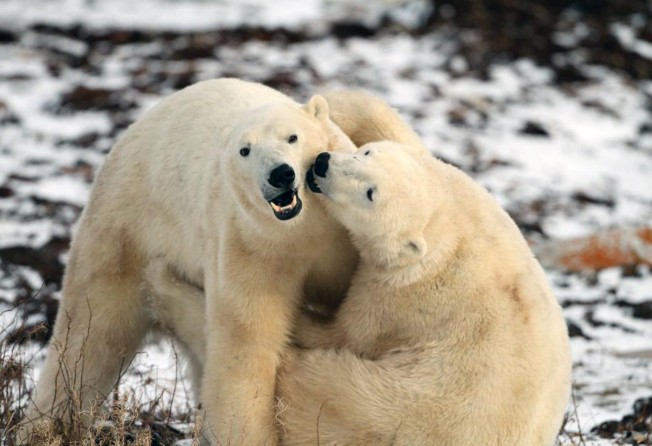Climate change puts polar bear and humans on collision course
Loss of sea ice due to climate change forces animals into risky and unusual behaviours

It was just a few days after a polar bear had mauled two people in the centre of town that the patrol officer pulled up by the school and scanned the rocky shoreline of Hudson Bay looking for a telltale white lump.
"There could be a bear, or several bears, right there hiding in the willows and you wouldn't even know it," said Bob Windsor, of Manitoba Conservation. There had been three sightings in Churchill that morning. There could be up to 20 on a November day.
Such is life in Churchill, a town with about as many polar bears as people.
But living with the bears is growing more risky due to climate change. The loss of sea ice has caused a precipitous drop in the bear population around Hudson Bay, forcing them off their platform for hunting seals.
The ice season in Hudson Bay has fallen by about one day each year over the past three decades, interrupting the polar bears' prime feeding season in the spring and keeping them off the ice longer into the autumn.
Scientists say the starving bears are resorting to risky and atypical behaviours, such as cannibalism, and are wandering far inland, where they encounter people in the small communities.
For Windsor, meeting a bear is all in a day's work. He carries a scare pistol, an array of firecrackers, an air horn and a paintball gun, and spends his nights and days herding polar bears back on to the tundra.
"The bears that we deal with in our programme, we are teaching them to be scared of people," Windsor said. "Every bear that we chase, maybe we are helping out somebody down the line that encounters a bear, because it recognises that that's a person and that is something to be scared of."
But Windsor's job is expected to grow more difficult with a warming Arctic.
Most encounters between the people of Churchill and the polar bears have been near misses. But in the pre-dawn hours of November 1, a bear ripped the ear of a young woman leaving a Halloween party and then pounced on a neighbour, mauling him.
Until this autumn, Churchill had a fairly peaceful history of living with polar bears, with only two recorded fatalities attributed to attacks from the creatures since 1717.
But authorities are increasingly going to have to confront difficult situations, as melting sea ice forces bears to hunt on dry land.
"We find bears that are nutritionally stressed or otherwise desperate will try things that are risky," said Tom Smith, a wildlife biologist at Brigham Young University who studies human-bear interactions.